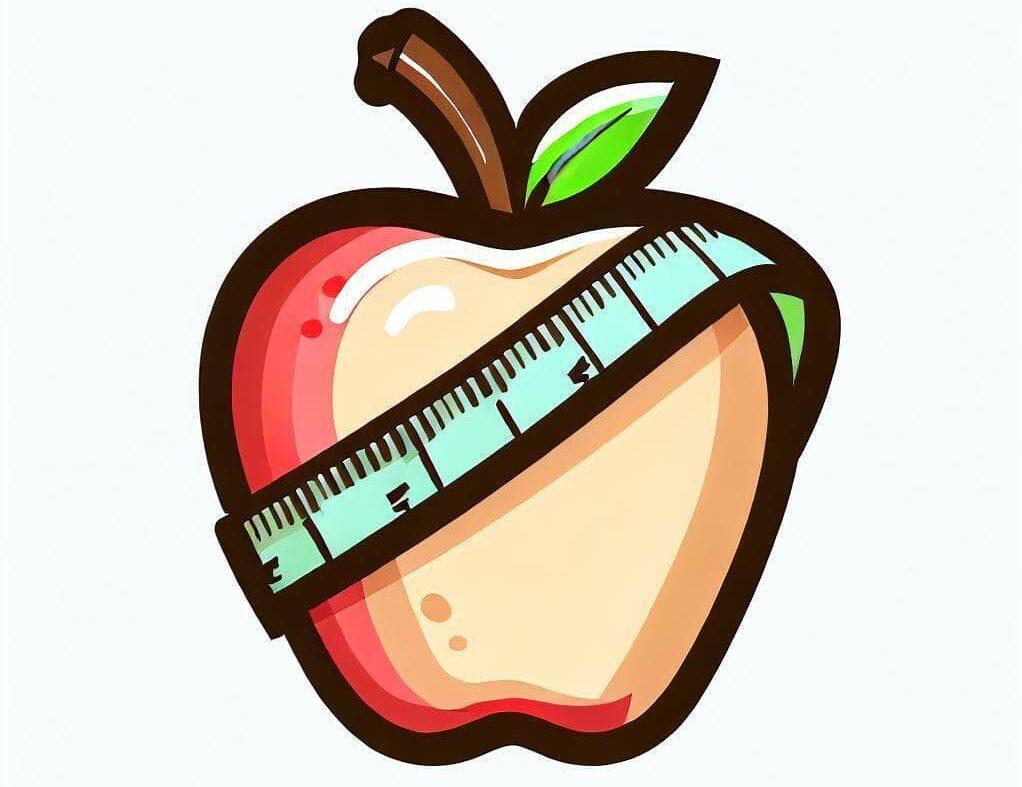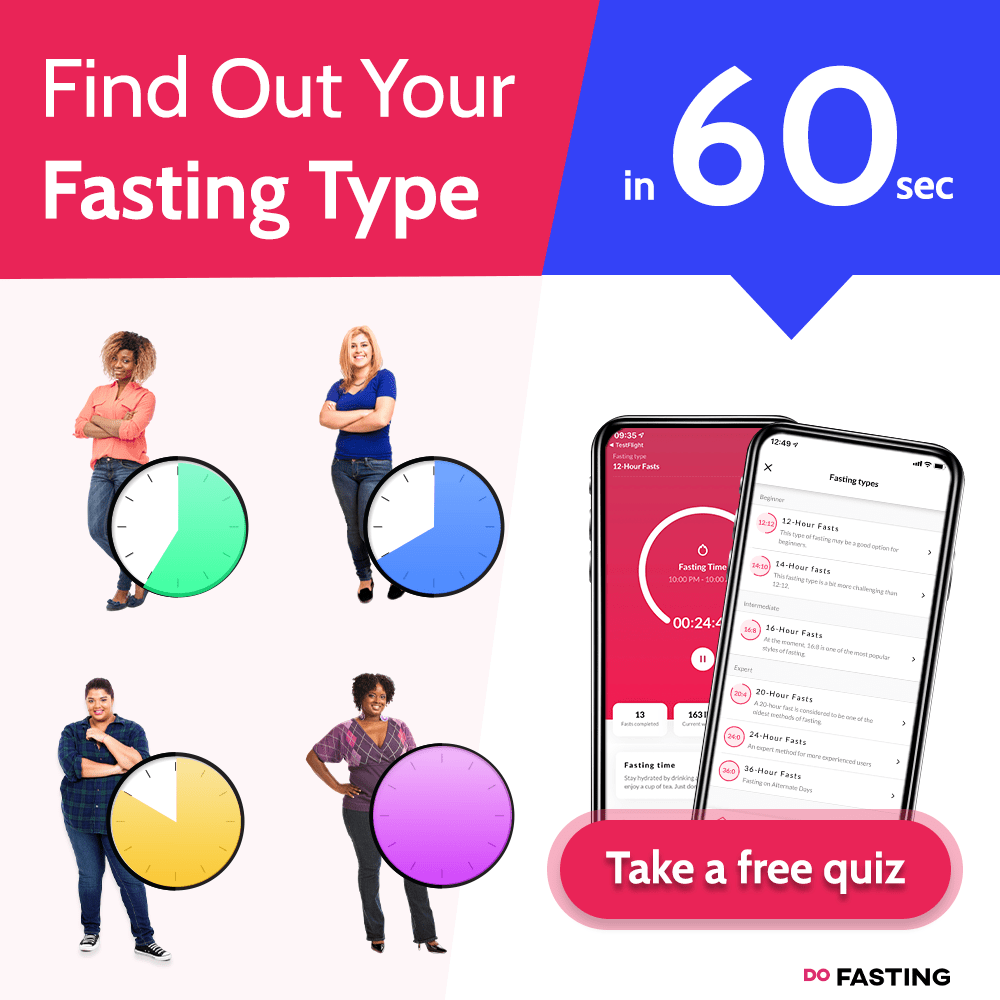Is Intermittent Fasting Good For Weight Loss?
This post may contain affiliate links which means I may receive a commission for purchases made through links at no extra cost to you. See my disclosure policy for more information.
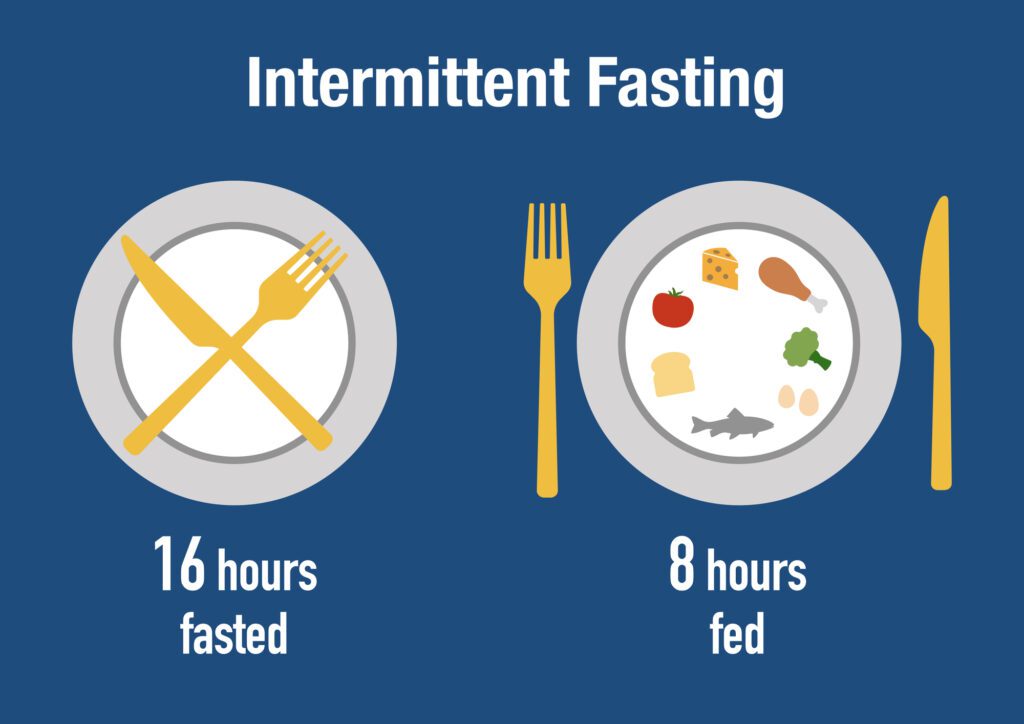
Yes, intermittent fasting (IF) can be good for weight loss. It works by making you eat for a shorter time and not eat, or take in calories, for a longer time.
In this way, it can help you lose weight in a couple of ways. One way is that it creates a calorie deficit. This happens because, with IF, you usually skip a meal, which could be breakfast or dinner. Most people choose to skip breakfast.
So, the calories you would have eaten at that meal are not eaten, and your body goes into fasting mode. When it’s in fasting mode, it has to use the energy it has stored, which is usually fat. Over time, this can lead to a decrease in your overall body weight.
However, it’s important to remember that IF isn’t for everyone. Not everyone needs to do it to lose weight. It depends on your daily routine and if you can handle not eating for longer periods without it affecting how you feel or how well you do at work or school.
That’s why, before you decide to try IF, I suggest you read this article. I will be talking about the good and bad sides of IF and how to do it in a safe way
Different Types Of Intermittent Fasting for Weight Loss
There are a few different ways to do Intermittent Fasting (IF). I won’t talk about all of them, but I’ll mention some popular ones for those who might not know. If you already know about these fasting methods, you can skip to the next part.
Time-Restricted Eating (TRE)
When talking about IF, this is the one that arguably the most popular one. In this method, you eat all your daily meals within a specific time frame each day and fast for the rest of the day.
Example: If you follow a 16/8 TRE schedule, you might eat your first meal at 12 PM and finish your last meal by 8 PM. From 8 PM until 12 PM the next day, you would fast.
Alternate-Day Fasting
This method involves alternating between days of normal eating and days of fasting or significantly reduced calorie intake.
Example: On Monday (fasting day), you either consume no calories or limit your intake to about 500 calories. On Tuesday (eating day), you eat normally. This pattern repeats throughout the week.
The 5:2 Diet
You eat normally for five days of the week and restrict your calorie intake on the other two days.
Example: You might choose to restrict your calorie intake to 500-600 calories on Tuesday and Friday while eating normally on the other days of the week.
Periodic Fasting or Whole-Day Fasting
This involves fasting for a full 24 hours or more, done occasionally.
Example: You might start your fast after dinner on Sunday at 7 PM and not eat again until dinner on Monday at 7 PM, completing a 24-hour fast. Alternatively, you could extend the fast to 48 hours, not eating until dinner on Tuesday at 7 PM.
Benefits Of Intermittent Fasting For Weight Loss
There are multiple ways in which IF can help you lose weight from daily calorie restriction or burning fat for fuel in general, Let’s go over each of them in detail.
It Will Help Create a Caloric Deficit
In short, to lose weight, you need to consume fewer calories than your body requires to maintain its current weight.
For instance, if you weigh 70 kg and your body needs 1800 calories to maintain this weight, you should aim to eat slightly less, say around 1600 calories. By doing this, you create a caloric deficit of 200 calories.
Since the body doesn’t get these calories from food, it has to break down stored energy, like fat, to make up for this deficit.
With intermittent fasting, you alternate between periods of eating and fasting, which typically means skipping a meal, usually breakfast or dinner. For example, let’s say you skip breakfast.
If your last meal was at 7:30 pm, your fasting window starts around 8 pm (assuming it takes half an hour to finish your meal).
In a 16/8 fasting schedule, your first meal would be at 12 pm, and your last meal would be between 7 – 8 pm. During this 8-hour eating window, you might only have 2 or 3 meals.
From my experience, most people opt for two larger meals instead of three. They might not feel as hungry or prefer not to prepare food three times in 8 hours.
In this scenario, you’d have lunch and dinner. The calories you would have consumed at breakfast are now eliminated, creating a deficit equal to what you would typically eat for breakfast.
When you do this daily, it leads to continuous calorie restriction and, over time, weight loss.
It Helps Reduce Hunger And Craving
A widespread belief I’ve noticed is that people think hunger levels continuously rise during fasting and become unbearable throughout the day. However, this isn’t actually true.
Consider this study where participants underwent a 33-hour fast, and their levels of the hunger hormone ghrelin were measured every 20 minutes.
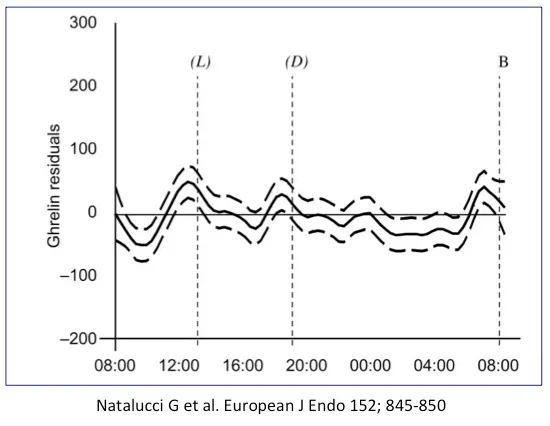
The graph shows that ghrelin levels were lowest in the morning between 8 – 9 am. This is interesting because it’s when they had been fasting the longest, having just woken up from a night’s sleep. You’d expect their hunger to be extremely high, but it wasn’t. Why?
Hunger at certain times is often a learned behavior, influenced by more than just our body’s need for food.
For instance, if you habitually eat breakfast at 9 am and lunch at 1 pm, you’re likely to feel hungry around these times, regardless of your actual need for food.
This is because your body has become accustomed to eating then and releases hunger hormones accordingly.
It’s similar to sleep patterns. For example, if you work from 7 pm to 5 am and sleep at 6 am, your body adjusts and releases the sleep hormone melatonin according to your new schedule.
This is why jet lag occurs when you travel across time zones – your body needs time to adjust to a new schedule.
The study’s chart showed that hunger levels rose and peaked before decreasing again. Hunger doesn’t stay constant; it comes in waves and can dissipate if ignored.
This is backed by the study above showing a ” decrease of ghrelin after approximately 2 hours without food consumption.”
It’s important to note that the study participants were accustomed to three meals a day, and their hunger hormone levels peaked around their usual meal times.
My point is that when you practice intermittent fasting and your body adapts to a new eating schedule, your overall cravings reduce.
This is beneficial for weight loss, as cravings are a major obstacle to sticking to a routine and often lead to excess calorie intake.
With intermittent fasting, you can train your body to confine hunger to your eating window. This adjustment doesn’t happen overnight; it typically takes about 2 weeks, though it can take longer for some people.
It Can Help You Burn Stored Fat
When you eat carbs, your blood sugar goes up. Then, your pancreas makes insulin. Insulin helps your cells use the sugar from your blood for energy or store it in your liver and muscles as glycogen.
When your blood sugar gets low, your pancreas makes less insulin. Your body then turns glycogen back into sugar to keep your blood sugar level normal. This is called glycogenolysis.
If you run out of glycogen, your body starts using fat for energy. This is called lipolysis. During this, fat from your fat cells goes into your blood and is used for energy by your muscles, organs, and brain.
But, if you have a lot of insulin in your body, it stops lipolysis. This means when there’s a lot of insulin, your body is more likely to store fat instead of burning it. When there’s less insulin, your body burns fat instead of storing it.
Intermittent fasting helps keep your insulin levels low because you eat less often and for shorter times. This means your body isn’t getting as much sugar, so it doesn’t need as much insulin.
When you’re fasting, your body uses fat for energy instead of sugar, which lowers insulin levels and helps burn more fat.
Downsides of Intermittent Fasting For Weight Loss
While the benefits are appealing you also have to learn about the downsides before trying this out.
You May Experience Intense Hunger In the Early Days

Yes, I know this might seem a bit opposite to what I said earlier about intermittent fasting reducing your hunger. But you have to remember, it takes time to reach that point.
If you’re someone who usually eats breakfast at 9 am and then you decide to start a 16-hour fast overnight, your body won’t adjust quickly. No, it will still expect food at 9 am like usual for at least a week or maybe two.
I can’t give you an exact time for when this hunger will go away because it depends on many things.
These include your overall weight, how active you are, your age, gender, how long you’ve been eating breakfast at that time, and what your breakfast is usually like.
But from what I’ve seen in my research and with my own clients, it usually takes a couple of weeks.
You need to be ready for this. This hunger can really test your will to keep fasting. But don’t worry, later in this article, I’ll write down some ways to help you handle this hunger and keep going with your fast.
You May Get Headaches

Actually, experiencing headaches is a common symptom reported by many people in the early days of fasting, especially when they skip their usual breakfast to start a new fasting routine.
Pinpointing the exact reason for these headaches can be challenging, as they can occur for various reasons.
One possible cause is hypoglycemia, a condition where your blood sugar (glucose) level falls below the normal range.
When your blood sugar drops, your body releases hormones like adrenaline and cortisol. These hormones help produce glucose from other sources, such as glycogen or protein, and activate the sympathetic nervous system.
This activation increases your heart rate, blood pressure, and breathing. It may also cause the blood vessels in your brain to dilate or constrict, leading to headaches.
Dehydration is another potential cause, possibly linked to low insulin levels. High insulin levels make the kidneys reabsorb more water and sodium, concentrating the urine.
When insulin levels are low, the kidneys excrete more water and sodium, diluting the urine and potentially leading to dehydration.
Dehydration causes your body to lose water and electrolytes, essential for fluid balance and nerve signals.
This can make your blood thicker and more concentrated, reducing blood flow and oxygen to the brain. This change can also trigger the dilation or constriction of blood vessels in the brain, causing headaches.
It’s difficult to determine the exact cause of these headaches, as they can arise from various factors not mentioned here.
You Could Potentially Lose Muscle Mass

This point isn’t talked about much, but it’s important. If you’re not careful with what you eat during your eating window, you might lose muscle along with fat, which isn’t good. We want to keep your muscle and only lose the extra fat.
Muscle loss happens when your body doesn’t get enough protein or calories to keep its muscles strong. This can happen if you fast for too long, do it too often, or don’t eat the right foods and exercise enough when you’re not fasting.
Also, muscle loss can happen because of changes in your body’s hormones. These changes can affect how your muscles use protein.
For example, when you do intermittent fasting, can lower your insulin levels. This might mean your muscles don’t get as many amino acids and your fat cells release more fatty acids.
Your body starts using fat for energy instead of sugar, which is good for keeping muscle energy stores, but it might also mean you lose some muscle protein.
Tips For Doing Intermittent Fasting For Weight Loss
Here are some tips for you to keep in mind when starting out your fasting journey for weight loss.
Start With A Smaller Window of Fasting If You Are a Beginner
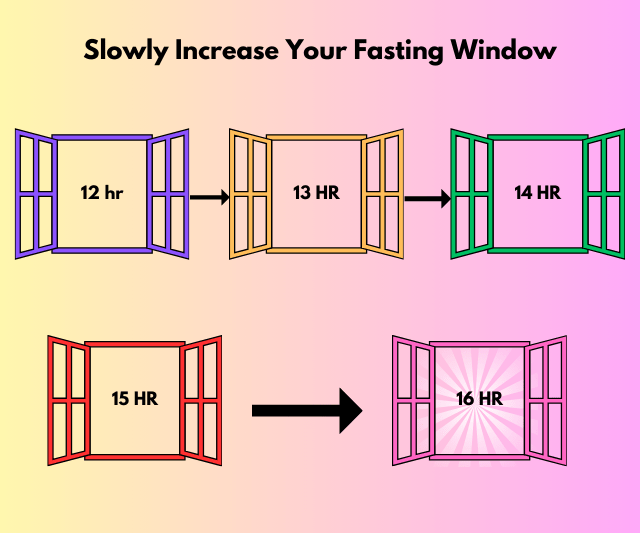
You don’t have to completely change your routine overnight, especially if the idea feels overwhelming.
Instead, start with a 12-hour fasting period and gradually increase to 16 hours if you’re following the 16/8 intermittent fasting (IF) method. Practically, you could add 1 hour every 4 days.
For instance, if you begin your IF regimen on Monday with 12 hours, increase it to 13 hours on Friday, then to 14 hours four days later, and so on, until you reach the 16-hour mark.
This approach is particularly useful for beginners who are trying time-restricted eating for weight loss.
It’s important not to feel discouraged right from the start. To avoid overwhelming hunger and headaches, start slowly and incrementally adjusting your eating pattern.
Remember, IF is not a quick fix; it’s a lifestyle change. It’s more important to do it correctly than to rush into it. So, even if it takes time to reach the 16-hour fasting period in the 16:8 protocol, allow yourself that time. In the long run, it will be more beneficial.
Eat Normally During in Your Feeding Window
What exactly do I mean by this? As I mentioned earlier in the article, one of the key aims of Intermittent Fasting (IF) is to reduce your daily calorie intake.
This reduction is usually achieved by skipping a meal, like breakfast. But, if during your eating window, you try to eat extra to make up for the calories you didn’t get at breakfast, then you’re missing the whole point of IF.
The idea is that by skipping breakfast, you won’t feel too hungry and will only consume the calories from your lunch and dinner.
So, simply eat your lunch and dinner as you normally would, without trying to make up for the breakfast you skipped or compensating for it.
Avoid Eating Junk Foods in Your Feeding Window
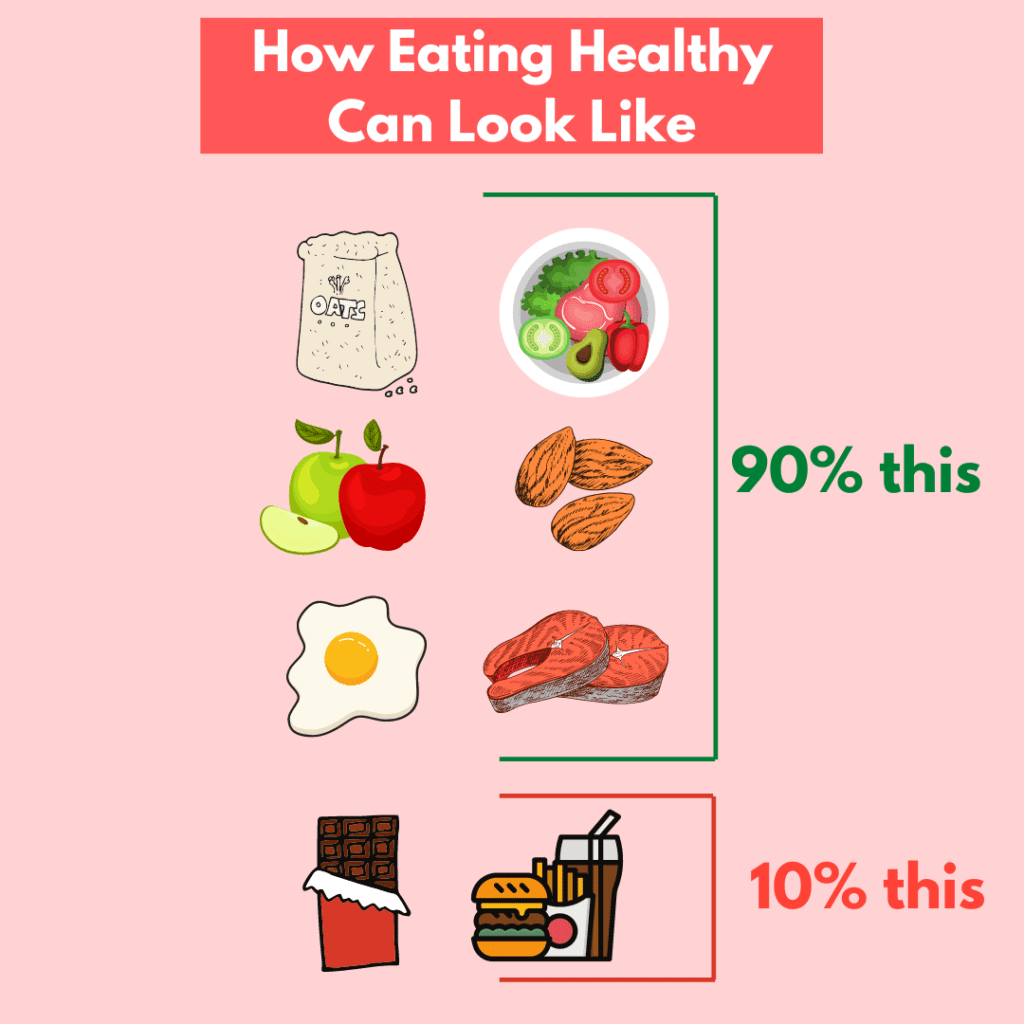
I want to address a common misconception I’ve noticed among people who fast. Some believe that fasting gives them the freedom to eat whatever they want during their feeding window. Unfortunately, this isn’t the case. Remember, you are what you eat.
If you consume ultra-processed foods during your feeding window, thinking you’ll ‘burn it off’ during your next fasting period, you’re mistaken.
Once you eat something unhealthy, the damage to your body is done, and it can’t be reversed simply by fasting or exercising more.
By ‘damage’, I mean the effects of eating high-sugar, high-salt, and unhealthy-fat foods like candies, chips, soda, and fast food. These are harmful not just for weight loss but also for your overall health.
For example, eating candy causes your body to release a lot of insulin to manage the sugar entering your bloodstream. When your cells are full of glycogen, your body has no choice but to store the excess sugar as fat.
So, it’s crucial to understand that what you eat matters, especially when trying to lose weight. It’s better to choose home-cooked meals where you can control the ingredients and avoid foods and drinks high in sugar.
Now, I am not saying that you can never eat any sort of processed foods ever, just that eat them in moderation, 90% of the diet should be made up of whole grains, lean protein, green leafy veggies, fruits, and healthy fats.
Make Sure To Do Some Sort Of Resistance Training

Like I said before, choosing intermittent fasting is about picking a lifestyle to help you lose weight. But, at the same time, you should do things that support this lifestyle and help you reach your weight loss goals.
One of these things is building muscle mass. When you lift weights or push against something heavy, you’re making your muscles work harder than they’re used to.
This is what’s called ‘overloading’ the muscles. Doing this causes small damages or tears in the muscle fibers.
After you finish your workout, your body starts to repair these tiny tears. It’s this repair process that makes your muscles stronger and, as time goes on, bigger.
Why is this important for losing weight? Building muscle is key because muscles use more energy than fat does. When you have more muscle, your body burns more calories all the time, even when you’re just sitting around doing nothing.
This happens because muscles need more energy just to maintain themselves. So, the more muscle you have, the more calories you burn without doing anything extra. This makes losing weight easier, as your body is burning more calories every day.
Plus, when you’re stronger from having more muscle, you can do exercises more intensely or for longer, which also helps in burning more calories.
Also Read: Are Rowing Machines Good For Weight Loss?
Make Sure That Your Feeding Window Has Enough Protein
Remember when I mentioned in the downsides section about possibly losing muscle along with fat during your fasting window?
To prevent this, it’s important to make sure you’re feeding your muscles well when you’re eating. Dr. Gabrielle Lyon, a doctor who specializes in muscle health, suggests eating between 1.2 to 1.6 grams of protein per kilogram of your body weight every day.
Also, think back to when I talked about the tiny tears in your muscles that happen when you do exercises like lifting weights.
Your body needs protein to fix these tears. This is why eating enough protein is really important if you’re trying to build muscle.
When you eat protein, it breaks down into amino acids. These amino acids are like the small pieces your body uses to fix and make your muscles stronger.
So, by making sure you eat enough protein, you’re doing two things: you’re keeping your muscle cells fueled, and you’re helping your body build more muscle by giving it what it needs to repair your muscles after you exercise.
Also Read: 10 High Protein Meals For Weight Loss
Be Consistent

Unfortunately, the benefits of intermittent fasting for weight loss can’t be achieved overnight, or even in just a few days or weeks.
I would say, that to see some noticeable difference, you need to do it consistently for at least 6 to 8 months. This time might be longer for some people, depending on their individual lifestyles.
But the reason I emphasize consistency is because intermittent fasting is a big change for your body. Your body is used to getting its carbs, protein, and fats in the morning through breakfast.
But now, you’re telling it that it won’t get this anymore. So, for your body to adjust to this new routine, it will take a while.
This is also true for your whole circadian rhythm, which includes things like your hunger hormones, blood sugar levels in the morning, growth hormones, and how your body signals when you’re hungry. All these need to slowly adjust to your new eating routine.
So, the point is, you have to stick with it in the long term to really notice its health benefits, especially the benefits for weight loss.
Use Digital Tools To Guide You
Intermittent fasting is best done under expert supervision that’s why I recommend using apps like Dofasting.
This app provides you daily schedule that includes hours for fasting and a tool to keep track of your fasting.
It offers many types of fasting and tips from nutrition experts to keep you going.
The app also has features like simple recipes that are good for you, exercise routines made by fitness trainers, and a collection of easy-to-understand articles and tips for every day.
The best part about this app is that you can try out their services for 1$ for one week and see if it helps in you any way in your fasting journey.
Strategies to Manage Hunger During Intermittent Fasting For Weight Loss
As promised before, here are some strategies to deploy when you get hunger cravings, especially in the early days of starting your intermittent fasting.
Stay Busy
One of the best things you can do is just keep yourself occupied with something, this can be some task at work or if you are a homemaker, find something you want to take care of and keep doing it until the peak in your hunger hormone goes down.
Because a lot about hunger is psychological so if you put your mind on accomplishing a particular task you are telling your mind that this is what is important right now and you are not going to be eating.
So slowly but eventually the mind gets the signal and the hunger hormone will go down.
Drink Some Water or Green Tea
Water is actually pretty good at tricking your mind into believing that it’s getting food. Because what happens is when you drink water, it literally fills your stomach and stretches its walls, which sends signals to your brain that you are full.
Another way it works is When you drink water, your stomach secretes less ghrelin, which reduces your hunger and cravings.
When it comes to green tea, studies show that green tea can have a mild satiety effect although it is not much since we drink tea in a small amount anyway but with the combination of water and the ingredients of green tea you can use it to curb your hunger.
Also Read: The Best Time To Drink Green Tea For Weight Loss
Go For a Walk
If the above strategies aren’t working for you or you don’t like to drink something when you are feeling hungry, the best thing to do is simply take a stroll in the park or preferably in nature.
If you have a dog it’s even better, you can go to a place where you can let it off leash and run and play with your doggo.
The way this works is walking or running impacts the release of ghrelin and peptide YY, two hormones key to your body’s appetite regulation. This can result in feeling less hungry throughout the day and feeling fuller sooner when eating.
This is further backed by evidence. A study found that just a short bout of walking (only 15 minutes) significantly reduced cravings for chocolate.
This is likely due to its ability to increase dopamine in the body, a hormone that provides an increased sense of pleasure and satisfaction.
Plus walking outside in nature can simply keep your mind off of food as compared to being in a supermarket or at home.
Make Use of Appetite Suppressant Supplements
If you find that none of the above strategies are effective and you’re feeling frustrated by persistent hunger during your fasting periods, consider using an appetite suppressant supplement.
An appetite suppressant like The Essential Fiber Complex can help manage your hunger pangs and support you through your fasting period.
However, if you are someone with an underlying health condition make sure to speak with your doctor before taking any supplements especially if you also taking other medications.
Conclusion
To finish off this long article, yes, intermittent fasting can help with weight loss. But, like I said, it has some downsides. The tips I shared in this article can help you handle these downsides.
But remember, if you have health problems, you should talk to your doctor before you start intermittent fasting.
This is to make sure it doesn’t harm your health or cause problems with any medicines you’re taking.
FAQ
How much weight can you lose in a month on intermittent fasting?
Typically, you can lose 4-8 pounds in a month with intermittent fasting, but this varies based on individual factors like diet and exercise.
Does intermittent fasting burn belly fat?
Yes, intermittent fasting may help reduce belly fat by creating a calorie deficit and triggering a metabolic state where the body burns fat for energy.
Does intermittent fasting actually burn fat?
Yes, intermittent fasting can increase fat burning by boosting metabolism and hormone levels. When the body runs out of glucose from food, it switches to burning fat for fuel.
How long does it take for 16 8 intermittent fasting to work?
It may take about 2 – 4 weeks to see noticeable results with this method, depending on your calorie intake, activity level, and other factors.
This post may contain affiliate links which means I may receive a commission for purchases made through links at no extra cost to you. See my disclosure policy for more information.
Rahul is a professional nutritionist certified by the International Sports Sciences Association (ISSA) and a personal trainer certified through the American Council of Exercise (ACE). He has a special interest in the science of nutrition and how it can impact the body.
